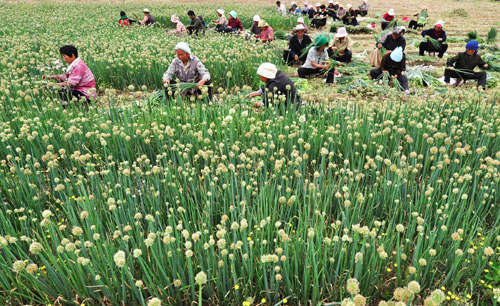|
 |
|
VEGGIE FACTORY: Farmers harvest shallots at an industrial plantation in Mingji Township, Zouping County in east China's Shandong Province, on May 22, 2012 (DONG NAIDE) |
When Zhang Shifang started growing strawberries in her 10 greenhouses in Cuicun Township of Beijing's Changping District in 2005, she made 40,000 yuan ($6,428). Nowadays her strawberries never fail to sell out, and tourists flock to her farm to pick their own by hand.
"We use harmless pesticides. The strawberries can be eaten without being washed," Zhang said. "The government pays for half of such materials as pesticide and fertilizers."
The government subsidizes a farmer 30,000 yuan ($4,821) per strawberry greenhouse, each requiring 50,000 to 80,000 yuan ($8,035-$12,856) to build. According to The Beijing News, Wang Lifu, Deputy Director of the Rural Service Center of Changping District, the government subsidizes seeds, fertilizer and equipment, which has raised farmers' enthusiasm for growing strawberries, a crop that is ordinarily so labor- and capital-intensive to dissuade most small farmers from cultivating.
Strawberry sales in Changping have skyrocketed from 40 million yuan ($6.4 million) in 2005 to 388 million yuan ($62 million) in 2012.
The rural population's income increased 3 percent faster than that of urban residents in 2010 and 2011, and 2.5 percent faster in the first three quarters of 2012. Continuing to narrow the gap in 2013 is a goal set at the Central Rural Work Conference held last December.
The conference mapped out the path of developing rural areas in the next few years, emphasizing an increase in rural residents' income, reflecting the Party's concern for farmers' interests. The Party will continue to improve the farmers' living conditions and coordinate the development of rural and urban areas.
The 18th National Congress of the Communist Party of China (CPC) held last November promised that rural and urban residents' 2020 per-capita income would be double that of 2010, which means that the farmers' annual per-capita net income should grow by 7 percent annually. According to Minister of Agriculture Han Changfu, "The goal of rural work in 2013 is to ensure food safety and supply of important farm produce, and increase farmers' income. Grain output is expected to stay above 525 million tons and farmers' income is to grow by more than 7.5 percent."
Currently, the development of rural areas and the improvement of farmers' living conditions rely on the government's policy and financial support. However, the Chinese Government is also calling for active involvement of social forces in developing rural areas, particularly cooperatives.
The CPC Central Committee issues a document at the beginning of each year identifying key problems in need of urgent solutions. The past nine concerned rural development and improving farmers' welfare.
In 2006, China lifted a burden from farmers by abolishing the 2,600-year-old agriculture tax.
In recent years, many farmers have left farms to work in cities, instigating an agricultural transformation from household production to large-scale intensive production in order to improve efficiency. Improving infrastructure and utilizing science and technology in agriculture have become twin foci of rural development.
The 2012 CPC Central Committee document stressed the importance of modernizing agriculture and realizing stable growth of grain output with the help of science and technology.
At the beginning of last year, the Ministry of Agriculture organized agricultural experts to give advice to farmers on growing grains in order to achieve high grain output.
Grain output realized a ninth consecutive year of growth in 2012 in spite of frequent natural disasters and fluctuations in food prices in the international market.
Bi Meijia, chief economist of the Ministry of Agriculture, said, "To improve grain growers' income, we should enhance overall agricultural productivity and reduce the impact of natural disasters. At the same time, we need to increase investment in agriculture and give more subsidies to farmers."
| 